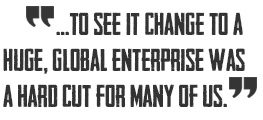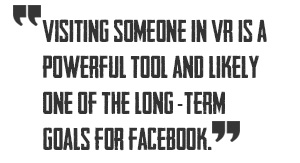If you liked the future and you want to see more, please check out Facerig’s promotional video it’s absolutely incredible!
Tag Archives: virtual reality
The Facebook Rift – What Happened to Virtual Reality?
How many times have we been captivated by the thought of virtual reality existing in our everyday lives? Through Star Trek‘s Holodeck, the Matrix, video games and mountain piles of science fiction, we’ve kept the dream of seeing this technology working. Two years ago, this concept came to live, in the hands of a team called Oculus VR. Early testers were so impressed with the prototype that a consumer version was announced! But as we kept daring ourselves to dream further, we woke up; Facebook was now the owner of Oculus.
Don’t know what an Oculus Rift is? Here’s a short F.A.Q.
Oculus Rift was embraced and funded by thousands of passionate gamers and developers on its kickstarter page. With a $2 million dollar budget, the team behind it promised (and delivered) a VR headset that would render images to a screen in stereoscopic 3D and would follow head movement and the user’s position in space. The funding goals, however, didn’t include an eventual acquisition by a major company. When the news of Facebook buying Oculus VR became public, the prevailing reaction was bitter disapproval.
“The recent VR movement came from a crowdfunding initiative,” said Dominic Eskofier, a moderator for the subsection of Reddit dedicated to Oculus Rift, “and to see it change to a huge, global enterprise was a hard cut for many of us.” Reddit had become a hub for disappointed fans to express their frustration with the Facebook-Oculus VR deal. “I think the image of a huge, global entity “swallowing” a small crowd-funded company is one of the main reasons for the negative reaction Oculus received in online communities.”
The backlash against Facebook’s acquisition of Oculus Rift was severe. Even the company’s CEO Brendan Iribe didn’t expect such a negative response from people beyond the core community. Founder of Oculus VR Palmer Luckey took to Reddit to alleviate some of the major concerns users had expressed. He explained that the partnership with Facebook doesn’t limit the team’s vision for Oculus; rather, it provides the financial resources they need to push the headset into the mainstream market. Mark Zuckerberg himself stated in a post that Facebook’s goal is to help Oculus VR branch out and partner with developers to support more game titles and that the company will continue to operate independently. He also shared his company’s vision for VR that expands far beyond gaming: connecting with other people in an artificial world.
Some remained sceptical, largely due to Facebook’s shady past of misusing the personal data of its users. “Facebook does have a history of less than moral conduct under their belt.” noted mobile developer Darien Phoenix. “There are incidents of dead friends of people “liking” things that they would have never liked.” In 2010, a Wall Street Journal investigation discovered that Facebook has been selling the names of users of their top-rated apps to dozens of net-tracking and advertising companies. In 2013, Facebook was marked by The Guardian as one of nine Internet companies (including Google, Apple, Microsoft and Yahoo) who had given the US government access to their users’ data. These reports led to the massive privacy scandal with the NSA.
“A lot of developers are inclined to believe in a certain set of principles such as “gaming-first” or “indie is better” so aligning with something as mainstream as Facebook is not an easy pill to swallow.” added Phoenix. An issue a lot of Oculus Rift backers have with the deal is that Facebook is neither a hardware nor a gaming company. To them, the “partnership” was motivated not by a unified vision for the VR headset, but by which investor could offer the biggest check to Oculus. “In some cases, it may go directly against an individual’s principles to sell out or work with a company that violates privacy in the manner that Facebook does it. “
Facebook will NOT rebrand Oculus with its logo and UI
The acquisition also caused a ripple in developer relationships with project Oculus. Maker of the now cult-classic game Minecraft Markus “Notch” Persson expressed his thoughts on the controversial news in a blog post. “We were in talks about maybe bringing a version of Minecraft to Oculus. I just cancelled that deal. Facebook creeps me out.” he announced on Twitter. Others, like founder of the legendary id Software studio John Carmack, remained hopeful that Facebook would pursue great success with VR, given how much they’d invested in acquiring Oculus.
“After the initial shock, I think that Facebook will have a positive impact on VR technology and acceptance,” reasoned Eskolfer. “Their name and especially their money will make it possible for Oculus to put resources into R&D (research and development) and developer communication and manufacturing, which wasn’t possible before. “Visiting someone in VR is a powerful tool and likely one of the long-term goals for Facebook.”
What is Facebook trying to tell us about Oculus?
The promise of virtual reality is hard to sell to a software developer. With Facebook driving the production line and marketing, companies will likely take far greater interest in Oculus Rift. The deal also allows the team to design and produce parts built specifically for virtual reality hardware (due to financial constraints, they were using commodity components for smart phones)
So far Facebook has shown no signs it wants to distract the people working at Oculus VR from their vision. If anything, it has given them a platform to successfully launch a consumer-priced virtual reality headset. As Luckey puts it in an interview for The Verge, “we’re a rocket, and we just attached ourselves to an even bigger rocket”.
Virtual reality is an inevitable progress in technology. With Sony, Google and Microsoft working on competing products, the future for these headsets has never looked brighter. Though the fear remains that corporate interest will exploit consumers through virtual reality, at present time we’re left to speculate. Maybe this is the push VR needs to become the next key form of media?




